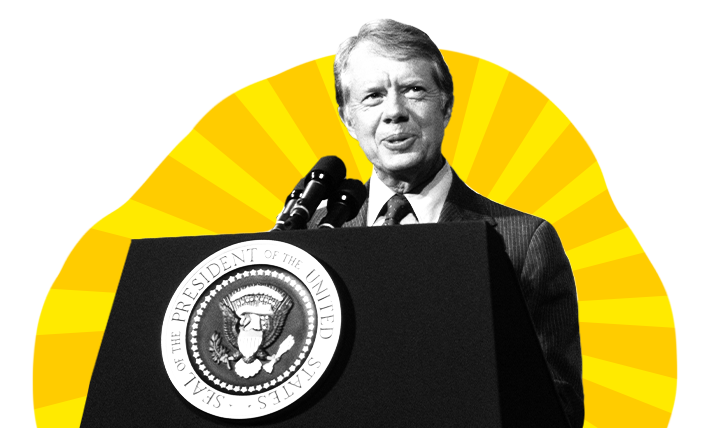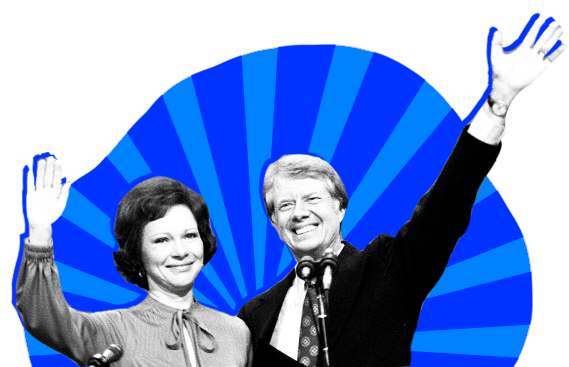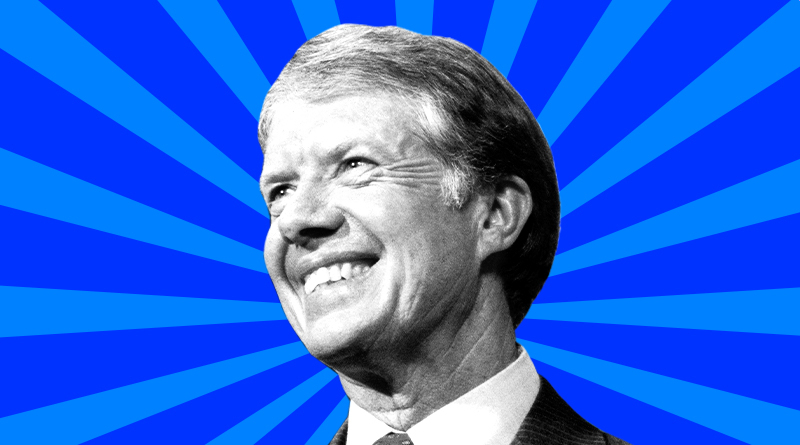The road that led to Jimmy Carter is a curious one.
Not the physical road — you flew into the Southwest Georgia Regional Airport and drove about an hour north to Plains, where he and his wife of nearly 77 years, Rosalynn, lived in the small, four-bedroom ranch house he built in 1960.
But the path to rediscovering Jimmy Carter, the 39th president whose administration had long been maligned as weak and ineffectual, is less direct.
One journalist found relief at the presidential library in Atlanta, rifling through Carter’s files to soothe his worried mind after delivering on-air analysis of Donald Trump’s rise.
One historian watched Carter preach Sunday school to a gaggle of old southern ladies in a small parish hall, and was rocked by the forcefulness of her reaction to his witness.
One professor watched class after class of college students fall in love with Carter’s infamous “malaise” speech, expressing the fervent wish that a president of their time would speak with such honesty.
Carter died Sunday at his home in Plains, his son Chip told reporters. He had turned 100 in October.
For years, the conventional wisdom has held: Carter was a bad president, but an exemplary ex-president.
But in the last decade, a churn of work — biographies, documentaries, books — has been produced aimed at reevaluating the Carter presidency.
“He wasn’t a failed president — he was a very effective, consequential president on all kinds of legislation and had foreign policy triumphs most presidents should envy,” Kai Bird, Carter’s recent biographer, told TPM in 2021.
Some found Carter to be prescient, almost prophetic, in his concern about climate change and the Israeli-Palestinian conflict. Some found him to be ahead of his time in his diversification of the federal judiciary and preservation of wide swaths of Alaskan wilderness. Some found him to be distinctly unsung, with little attention given to his brokering of peace with the Camp David Accords and emphasis on global human rights.
And some just liked him. A serious, intelligent, faithful, deeply honest man who spurned political expediency and burned through hundreds of pages of memos a day, he preached self-restraint, stewardship and commonality to an electorate that cast him off four years later for the glib excesses of Ronald Reagan.
But in recent years, there’s just something about Carter that’s resonating.
A Moment of Malaise
It’s impossible to talk about Carter’s current appeal without mentioning Trump.
“People are trying to grapple with the phenomenon of Trump, and figure out how someone so loathsome and amoral could be President of the United States,” Nancy Mitchell, a historian at North Carolina State who published 2016’s “Jimmy Carter in Africa,” told TPM in 2021, soon after Trump left office for the first time. “If you want to look back to a moral president, Carter is the most obvious recent choice.”
“He’s the un-Trump,” Jonathan Alter, who wrote the first independent Carter biography in 2020, in an interview around the same time.

Where Trump lied, by one count, over 30,000 times by the end of his presidency, Carter was honest to the point of self-inflicted political pain. Trump commissioned ludicrously glowing health reports and took a still-mysterious trip to the hospital; Carter disclosed when he had hemorrhoids.
Trump was a scandal magnet, and faced a bevy of lawsuits stemming from his business deals, alleged sexual assaults and attempts to overthrow the 2020 election. One of the headlines from the Carter administration involves a placidly rowing Carter running afoul of an aggressive swamp rabbit.
Trump refused to reveal his taxes; Carter started the practice of presidents releasing entire tax returns, and put his assets in a trust.
“Particularly after Trump — but not only Trump — after the sex scandals of Bill Clinton, the craziness of the George W. Bush presidency that got us into Afghanistan and Iraq, Jimmy Carter is looking pretty good,” Bird said. “No war, no sex scandals, no scandals to speak of — he was ethically pristine.”
Removed from but intrinsically connected to Trump is the sentiment that permeates swaths of the country and allowed him to rise: intensive individualism, disdain for compassion as weakness, a grievance manifested in an us vs. them mentality. Again, Carter is a foil to the Trump ethos.
“Carter expressed that the soul of America was broken from too much selfishness,” Kevin Mattson, a historian at Ohio University, told TPM in 2021. “I think that appeals to people given what we’re living through right now.”
Ahead Of His Time
Jimmy Carter revivalists argue that his legislative accomplishments reveal a prolific presidency, and his failures the foresight of a president worried about problems that would continue to haunt the country decades later.
“People assume that because he wasn’t warm and cuddly with Congress that he didn’t get much through,” Alter said. “He signed more legislation in four years than Clinton or Obama did in eight. He has the most prodigious legislative record since World War II, with the exception of Lyndon Johnson.”
That record includes, by Alter’s count, 14 major pieces of environmental legislation. In one of Carter’s more creative moves, he dusted off the 1906 Antiquities Act to keep pristine 56 million acres of Alaskan wilderness.
His piecemeal approach, cloaked in distinctly unsexy bills like the 1978 Public Utilities Regulatory Policies Act, planted the seeds for a changing national energy system in the face of climate change. Carter had started underlining passages in scientific journals about what is now the most existential crisis of our time as early as 1971.

What’s most wrenching about Carter’s improvements in energy and environmental policy now is what he wasn’t able to accomplish. On his way out of office, he issued a report that included recommendations for cutting carbon emissions — at exactly the same rate the Paris Climate Accords coalesced behind 35 years later.
“He was the first head of state anywhere in the world who took it seriously,” Alter said.
Carter was also progressive in ways that seem to defy his upbringing in the deep South to a father who, like nearly all of their neighbors, was open in his belief in white supremacy.
He diversified the federal judiciary at a staggering rate, appointing five times the number of women than all of his predecessors combined. One of those judges — who said: “the first time I ever thought of being a judge was when Jimmy Carter announced to the world that he wanted to change the complexion of the U.S. judiciary, which he did” — was Ruth Bader Ginsburg.
Of the 40 women he appointed, eight were women of color. He appointed 57 judges who were people of color. By the time he left office, with additions from his nominating commissions, there were about 80 people of color and 47 women in the federal judiciary — a largely forgotten accomplishment with enormous knock-on effects both in terms of those judges’ decisions and the precedent that diverse nominations became a requirement for particularly every Democratic president to come.
Carter is perhaps best known for his foreign policy decisions, often to his reputation’s detriment. The Iran hostage crisis put his administration in a stranglehold, and Reagan used his stance on the Soviet invasion of Afghanistan as a cudgel in the primaries.
But, experts found that the sour note ending his administration obscured the many foreign policy successes he enjoyed.
“You move away from Iran and look at the first human rights policy, normalizing relations with China which are the foundation of the global economy, the Panama Canal treaties which prevented major war in Central America and the Camp David Accords, which were the most durable peace treaty since World War II,” Alter said.
“In foreign policy, he doesn’t get his due,” Mitchell added. “He wasn’t a great president, but he was a lot better than most.”
Post-Presidency Burnishment
Carter has also just been around long enough to invite a second look. He died at age of 100, at least a decade since he was habitually invoked as a punchline.
And he used the time not to paint or produce Netflix specials or rake in cash from a speaking tour, but to earnestly better the world.

His Carter Center has virtually eradicated certain devastating diseases on the African continent, part of the work for which he received the Nobel Peace Prize in 2002. He and Rosalynn have also helped build and repair over 4,000 homes for Habitat for Humanity, work that continued well into his 90s.
Carter has essentially freelanced as an ambassador and mediator in foreign crises, including a high-profile nuclear weapons dispute with North Korea.
And his advanced age hasn’t blunted the instinct.
“He had a phone call with a U.S. senator a couple weeks ago where he was lobbying him about the terrible political situation in Nicaragua,” Bird recalled, speaking with TPM in 2021. “He’s 96!”
Some of the reevaluation may also stem from more logistical realities. The Carter Presidential Library has declassified many more documents now, and Carter agreed to sit for interviews with his two most recent biographers, something he was generally opposed to in the years prior.
Paul Volcker served as Carter’s Federal Reserve chair. His excruciatingly painful measures finally lowered the sky-high inflation rate that had plagued the Carter administration, but the results only kicked in after Reagan had become president. Towards the end of his life, Alter said, Volcker came up to Carter and apologized for potentially costing him reelection. Carter laughed and said: “There are many factors, Paul.”
There are many factors contributing to the Jimmy Carter renaissance, and they all work in concert to burnish the legacy of a man once dismissed as a one-term failure.
“He was always trying to be intelligent and hardworking and decent and to find smart answers to the political problems that came across his desk every day,” Bird said. “That should give us pause — isn’t that the kind of president we should all want?”







I admired him in and out of office.
An honest guy who rose to the top and that is exceedingly rare as most honest folk who get into politics have short careers
RIP, Jimmy Carter. A life of a servant well lived.
Jimmy Carter was the anti-Trump. WAY TOO good.
Hopefully Trump will be barred from the funeral.
Jimmy Carter is the favorite president of my mother, who was born in rural northern Alabama, the granddaughter of sharecroppers. She said he was the kindest, most decent of any in her lifetime. I concur with her assessment.